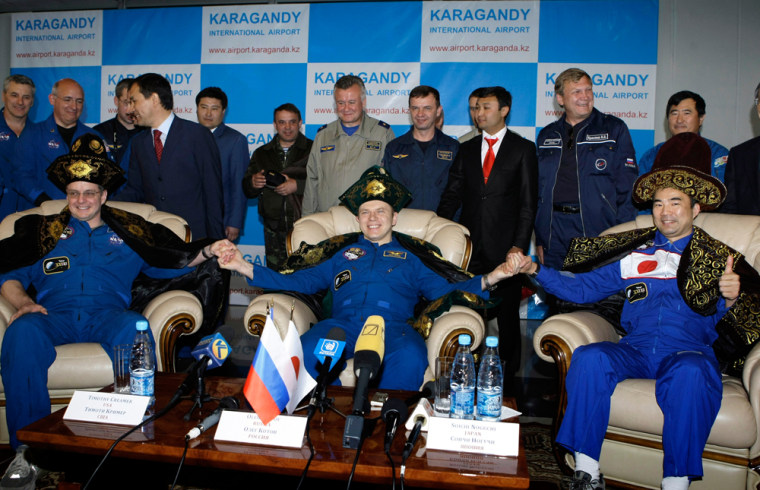A Russian Soyuz spacecraft landed safely in Kazakhstan late Tuesday to return a Russian cosmonaut, a NASA astronaut and a Japanese spaceflier back home from the International Space Station after nearly six months in orbit.
The Soyuz TMA-17 spacecraft touched down on at about 11:25 a.m. ET (9:25 a.m. local time Wednesday) on the central steppes of Kazakhstan in Central Asia.
Recovery crews reported that the Soyuz capsule had tilted on its side after landing, which has happened before, but overall it was a smooth landing, NASA officials said.
"Bye-bye station!" Russia's Oleg Kotov said as the Soyuz carrying him and two crewmates backed away from the station. "Beautiful view!"
Kotov returned to Earth with American astronaut Timothy "T.J." Creamer of NASA and Japanese astronaut Soichi Noguchi. The three men made up half of the space station's full six-person crew and had lived aboard the orbiting laboratory since mid-December.
"Oh! I forgot something. Can we go back?" Creamer joked as the Soyuz moved ever farther away from the station. His crewmates laughed.
Goodbye to space station
The Soyuz TMA-17 landed just hours after undocking from the space station at 8:04 p.m. ET as both spacecraft flew 215 miles (346 kilometers) above Mongolia. Kotov said the undocking went extremely smoothly.
"Strap in tight, guys," said station crewmate Tracy Caldwell Dyson, an American astronaut representing NASA who stayed behind on the station with two other cosmonauts to start the Expedition 24 increment. There were hugs all around as the two crews parted.
Dyson warned the three men returning to Earth not to stick their tongues out during the Soyuz's jarring landing. She and her remaining crewmates are in the middle of their own six-month mission.
During their 163 days in space, Kotov and his crewmates hosted three visiting NASA space shuttle missions. Those flights delivered a new NASA room, a seven-window observation deck, and vital spare parts and supplies.
The most recent visit by NASA's shuttle Atlantis in May delivered a new $200 million Russian research module called Rassvet (which means "Dawn" in Russian).
On Monday, Kotov officially turned control of the space station over to its new Expedition 24 commander Alexander Skvortsov. "Good luck, guys," Skvortsov told the spacefliers as they left the station. "Have a soft landing."
Last week, Creamer said that after more than five months on the space station, he was eagerly looking forward to returning to Earth and seeing his friends and family again. And while Creamer admitted that he will miss the camaraderie of his crew and the view of Earth from space, there are some creature comforts that cannot be re-created in weightlessness.
"Specifically, I'd really like to drink something not from a straw and have food stay on the plate for a change," he said.
New crew takes charge
With Kotov and his crewmates back to Earth, Skvortsov and his crew are getting started on the station's Expedition 24 mission.
Skvortsov arrived at the space station in early April with Caldwell Dyson and Russian cosmonaut Mikhail Kornienko. The spacefliers initially joined the Expedition 23 crew and will now remain behind to await the arrival of three new crew members slated to launch from Kazakhstan's Baikonur Cosmodrome on June 15.
That Soyuz TMA-19 spacecraft will launch with veteran Russian cosmonaut Fyodor Yurchikhin and American astronauts Douglas Wheelock and Shannon Walker on a new six-month mission that will also span several station expedition crews.
